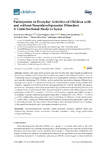Mostrar o rexistro simple do ítem
Participation in everyday activities of children with and without neurodevelopmental disorders: a cross-sectional study in Spain
| dc.contributor.author | Blanco Martínez, Nerea | |
| dc.contributor.author | Delgado-Lobete, Laura | |
| dc.contributor.author | Montes-Montes, Rebeca | |
| dc.contributor.author | Ruiz-Pérez, Nuria | |
| dc.contributor.author | Santos-del-Riego, Sergio | |
| dc.date.accessioned | 2020-11-25T10:48:48Z | |
| dc.date.available | 2020-11-25T10:48:48Z | |
| dc.date.issued | 2020-10-01 | |
| dc.identifier.citation | Blanco-Martínez N, Delgado-Lobete L, Montes-Montes R, Ruiz-Pérez N, Ruiz-Pérez M, Santos-Del-Riego S. Participation in everyday activities of children with and without neurodevelopmental disorders: a cross-sectional study in Spain. Children (Basel). 2020 Oct 1;7(10):157. | es_ES |
| dc.identifier.issn | 2227-9067 | |
| dc.identifier.uri | http://hdl.handle.net/2183/26768 | |
| dc.description.abstract | [Abstract] Children with neurodevelopmental disorders (NDDs) often report significant difficulties performing activities of daily living (ADLs), which may restrict their daily participation. The aim of this study was to investigate the differences in ADLs participation between children with NDDs and typically developing (TD) children, and to explore the associations between different daily participation contexts. A cross-sectional study was conducted that included twenty children with a medical diagnosis of an NDD and 26 sex- and age-matched TD controls. The daily participation across home, community, school, and instrumental living activities was measured using the Child and Adolescent Scale of Participation (CASP). The results show that children with NDDs engaged in lower participation in all CASP contexts (Δ = 1.7–5.5, p < 0.001) and had a significantly higher prevalence of moderate or severe restricted participation than their TD peers (OR = 23.4, 95% CI = 3.6–154.2, p < 0.001). Additionally, a strong association was found between the different contexts of participation (r = 0.642–0.856). Overall, the children with NDDs experienced significant participation restrictions on their daily activities. This study adds to the growing evidence showing that intervention strategies in this population should adopt a participation-oriented approach. | es_ES |
| dc.language.iso | eng | es_ES |
| dc.publisher | MDPI | es_ES |
| dc.relation.uri | https://doi.org/10.3390/children7100157 | es_ES |
| dc.rights | Creative Commons Attribution 4.0 International License (CC-BY 4.0) | es_ES |
| dc.rights.uri | http://creativecommons.org/licenses/by/4.0/ | * |
| dc.subject | Neurodevelopmental disorders | es_ES |
| dc.subject | Autism spectrum disorders | es_ES |
| dc.subject | Attention deficit and hyperactivity disorder | es_ES |
| dc.subject | Motor coordination disorder | es_ES |
| dc.subject | Activities of daily living | es_ES |
| dc.subject | Participation | es_ES |
| dc.subject | Occupational therapy | es_ES |
| dc.title | Participation in everyday activities of children with and without neurodevelopmental disorders: a cross-sectional study in Spain | es_ES |
| dc.type | info:eu-repo/semantics/article | es_ES |
| dc.rights.access | info:eu-repo/semantics/openAccess | es_ES |
| UDC.journalTitle | Children | es_ES |
| UDC.volume | 7 | es_ES |
| UDC.issue | 10 | es_ES |
| UDC.startPage | 157 | es_ES |






